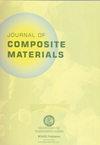Enhanced mechanical, tribological and corrosion properties of graphite and carbon nanotube-reinforced copper-based hybrid composites
IF 2.4
3区 材料科学
Q3 MATERIALS SCIENCE, COMPOSITES
引用次数: 0
Abstract
Copper (Cu)-based hybrid composites were fabricated by powder metallurgy, incorporating Graphite (Gr) and Carbon nanotube (CNT) reinforcements at various fractions. The composites were formed using a cold pressing technique and subsequently sintered at various temperatures. The structural properties of the hybrid composites were evaluated using Scanning Electron Microscopy (SEM), Energy Dispersion Spectrum (EDX) and X-ray diffraction (XRD). Hardness, compression, wear and corrosion tests were performed to show the effect of the reinforcements. It was shown that the hardness of Gr and CNT reinforcements have significantly improved the properties of pure Cu. The Cu-Gr-2CNT hybrid composite, which was subjected to sintering at a temperature of 850°C, exhibited the highest level of hardness, showing a significant increase of 51.4% in comparison to the pure Cu sample. While the compressive stresses increased in the Cu matrix with the addition of Cu-Gr, it increased to 350 MPa with the addition of 2 wt% CNT. The hardness value exhibited a similar increase and was measured to be 122 HV in Cu-Gr-2CNT. During the wear tests, the coefficient of friction values fell by 9.2% for Cu-2CNT, by 3.88% for Cu-CNT, by 3.92% for Cu-Gr-2CNT, and by 5.27% for Cu-Gr-CNT, as compared to pure Cu. The comprehensive findings demonstrated that the tests and analyses yielded consistent results, and the utilization of various combinations of Gr and CNT reinforcements enhanced the mechanical, tribological, and corrosion resistance properties of the fabricated hybrid composites. Nevertheless, the combination of Cu-Gr-2CNT yielded the most advantageous outcomes.增强石墨和碳纳米管增强铜基混合复合材料的机械、摩擦和腐蚀特性
铜(Cu)基混合复合材料是通过粉末冶金法制造的,其中加入了不同比例的石墨(Gr)和碳纳米管(CNT)增强材料。复合材料采用冷压技术成型,随后在不同温度下烧结。使用扫描电子显微镜(SEM)、能量色散谱(EDX)和 X 射线衍射(XRD)对混合复合材料的结构特性进行了评估。还进行了硬度、压缩、磨损和腐蚀测试,以显示增强材料的效果。结果表明,Gr 和 CNT 增强材料的硬度明显改善了纯铜的性能。在 850°C 温度下烧结的 Cu-Gr-2CNT 混合复合材料硬度最高,与纯铜样品相比,硬度大幅提高了 51.4%。虽然铜基体中的压缩应力随着铜-铬的添加而增加,但添加 2 wt% 的 CNT 后,压缩应力增加到 350 兆帕。Cu-Gr-2CNT 的硬度值也有类似的增加,测量结果为 122 HV。在磨损测试中,与纯铜相比,Cu-2CNT 的摩擦系数下降了 9.2%,Cu-CNT 下降了 3.88%,Cu-Gr-2CNT 下降了 3.92%,Cu-Gr-CNT 下降了 5.27%。综合结果表明,测试和分析得出的结果是一致的,利用 Gr 和 CNT 增强材料的不同组合提高了所制造混合复合材料的机械、摩擦学和耐腐蚀性能。然而,Cu-Gr-2CNT 的组合产生了最有利的结果。
本文章由计算机程序翻译,如有差异,请以英文原文为准。
求助全文
约1分钟内获得全文
求助全文
来源期刊

Journal of Composite Materials
工程技术-材料科学:复合
CiteScore
5.40
自引率
6.90%
发文量
274
审稿时长
6.8 months
期刊介绍:
Consistently ranked in the top 10 of the Thomson Scientific JCR, the Journal of Composite Materials publishes peer reviewed, original research papers from internationally renowned composite materials specialists from industry, universities and research organizations, featuring new advances in materials, processing, design, analysis, testing, performance and applications. This journal is a member of the Committee on Publication Ethics (COPE).
 求助内容:
求助内容: 应助结果提醒方式:
应助结果提醒方式:


